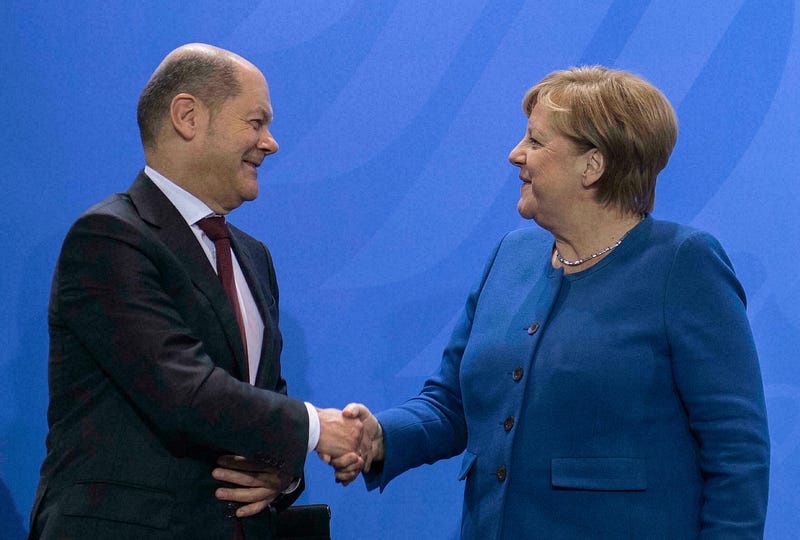
Following the announcement of Germany’s first new chancellor in 16 years, the Levitt Center presented a panel event featuring Alan Cafruny from the Government Department at Hamilton College, and Charlotte Carstens, a German Chancellor Fellow with Deutscher Städtetag. During the talk, Professor Cafruny and Ms. Carstens reflected on Angela Merkel’s chancellorship from 2005 to 2021 and what we can expect for the future of Germany.
Cafruny explained that when Merkel became chancellor, Germany had been outsourcing labor to other countries, which cut labor costs while retaining the core of manufacturing domestically.
Even though this process gave a boost to Germany’s economy, it also actively destabilized it (along with the rest of European economies), as the euro is very undervalued in Germany compared to the rest of Europe.
Along with the other coalitions, Merkel faithfully carried this system out, while also understanding the constraints imposed by this political-economic model and the problems faced by the German capital. To some extent, under Merkel, Germany moved away from this extreme austerity and into a new generation of fiscal policy for the European Union.
However, Cafruny believes this new policy was modest and unlikely to make a significant structural difference. There is still a budgetary straightjacket in Europe, and the new coalition does not seem like it will be able to change that.
Though the media paints Germany as a preparatory powerhouse within Europe, it is also very vulnerable, specifically to China, which threatens Germany’s automobile industry that makes up five percent of its GDP.
Merkel has always been outspoken regarding climate change throughout her political career, bringing attention to precisely the science of global warming on an international stage. However, Carstens claimed that Merkel’s domestic climate policy was not as ambitious because she did not want to employ policies detrimental to German industry.
Further, Carstens pointed out that Germany’s nuclear exit plan was an example of Merkel being pushed to implement new climate policies rather than acting on her own accord. When former chancellor Gerhard Schröder came up with a plan in 1998 to phase out nuclear power by 2022, Merkel “vehemently rejected this stance.”
Then, when she became chancellor in 2005, she reversed Schröder’s policy and decided to keep nuclear power around for a while longer. Less than six months later, the Fukushima Daiichi nuclear disaster on Mar. 11, 2011 caused Merkel to promptly change course and promise to phase out nuclear power by 2022 after all.
In addition to nuclear power, there is a push to phase out coal energy — the dirtiest, most polluting energy source. Carstens stated that in 2013, coal energy was almost half of Germany’s electricity production, but this has since decreased to about a quarter. A few years later, the German government set up a coal commission to develop a plan to phase out coal while taking into account the communities that depend on jobs in coal mines. The coal commission recommended Germany phase out coal by 2038. Even though this deadline is eight years after the Paris Agreement’s deadline of 2030, Germany passed a law in 2020 to phase out coal by 2038. Germany’s plan to phase out nuclear power and coal put the country in quite a bind as they search for alternative energy sources to go carbon neutral.
Although Merkel is globally passionate about protecting the climate, she caters to the automobile industry within her own country. Germany’s transportation sector accounts for 20% of all its greenhouse gas emissions, and while emissions from all other sectors decreased under Merkel’s chancellorship, transportation sector emissions have not decreased since 1990.
Additionally, when the European Union started discussing setting emission limits for cars, Merkel postponed the final decision until a year after the initial discussion. Carstens then described the final automobile emission limit decision as a “watered down” version.
According to Carstens, Merkel leaves behind a mixed legacy. On one hand, she was critical in gathering world leaders together and getting the ball rolling for conversations about climate change. On the other hand, her domestic climate policy is weak and somewhat disappointing.
The new coalition will be led by Olaf Scholz, who plans to incorporate members from three of Germany’s major political parties — the Social Democrats, the Greens and the Free Democrats — into the new government.
Carstens expects the ministers to remain vocal about climate change on the world stage while nuclear power is still on track to be phased out by the end of next year. Surprisingly, the new coalition also already made the ambitious decision to phase coal out by 2030 to meet the Paris Agreement.
















